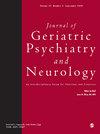Increased Systemic Immune-Inflammation Index as a Novel Indicator of Alzheimer’s Disease Severity
IF 2.5
4区 医学
Q2 CLINICAL NEUROLOGY
引用次数: 0
Abstract
IntroductionInflammatory processes and neurodegeneration are common features of Alzheimer's disease (AD). The systemic immune-inflammation index (SII), neutrophil-to-lymphocyte ratio (NLR), and platelet-to-lymphocyte ratio (PLR) are easily accessible, cost-effective prognostic indicators of inflammation status. We assessed the diagnostic value of SII and compared the efficacies of NLR, PLR, and SII in predicting AD severity.Materials and MethodsBetween January 2021 and December 2022, this prospective, cross-sectional clinical study included 175 patients with AD and 61 controls. SII, NLR, and PLR were calculated.ResultsAge, white blood cell and lymphocyte counts, and NLR and PLR values were significantly different between the patient and control groups ( P <.05). Age, hemoglobin, neutrophil, NLR, and SII values were significantly different among dementia severity subgroups ( P <.05). Compared with PLR and SII, NLR was more strongly correlated with dementia severity. In the analysis of adjusted data by gender, it was found that hemoglobin level is significantly negatively associated with dementia severity in males, while in females, age and PLR are significantly positively associated with dementia severity, and lymphocyte count and SII are negatively associated.ConclusionSII, a novel inflammatory marker, was associated with dementia severity in patients with AD. Compared with PLR and SII, NLR was more strongly correlated with dementia severity. In future studies with larger populations, SII and NLR values can be used to determine dementia severity and establish follow-up plans for patients with high dementia risk.作为阿尔茨海默病严重程度新指标的全身免疫炎症指数升高
导言炎症过程和神经变性是阿尔茨海默病(AD)的常见特征。全身免疫炎症指数(SII)、中性粒细胞与淋巴细胞比值(NLR)和血小板与淋巴细胞比值(PLR)是容易获得且具有成本效益的炎症状态预后指标。我们评估了 SII 的诊断价值,并比较了 NLR、PLR 和 SII 在预测 AD 严重程度方面的功效。材料与方法在 2021 年 1 月至 2022 年 12 月期间,这项前瞻性横断面临床研究纳入了 175 名 AD 患者和 61 名对照组。结果年龄、白细胞和淋巴细胞计数、NLR 和 PLR 值在患者组和对照组之间存在显著差异(P <.05)。痴呆严重程度亚组的年龄、血红蛋白、中性粒细胞、NLR 和 SII 值有显著差异(P <.05)。与 PLR 和 SII 相比,NLR 与痴呆严重程度的相关性更强。在按性别对调整后的数据进行分析时发现,男性的血红蛋白水平与痴呆严重程度呈显著负相关,而女性的年龄和 PLR 与痴呆严重程度呈显著正相关,淋巴细胞计数和 SII 呈负相关。与 PLR 和 SII 相比,NLR 与痴呆严重程度的相关性更强。在未来对更多人群进行的研究中,SII和NLR值可用于确定痴呆症的严重程度,并为痴呆症高危患者制定随访计划。
本文章由计算机程序翻译,如有差异,请以英文原文为准。
求助全文
约1分钟内获得全文
求助全文
来源期刊
CiteScore
6.20
自引率
0.00%
发文量
40
审稿时长
>12 weeks
期刊介绍:
Journal of Geriatric Psychiatry and Neurology (JGP) brings together original research, clinical reviews, and timely case reports on neuropsychiatric care of aging patients, including age-related biologic, neurologic, and psychiatric illnesses; psychosocial problems; forensic issues; and family care. The journal offers the latest peer-reviewed information on cognitive, mood, anxiety, addictive, and sleep disorders in older patients, as well as tested diagnostic tools and therapies.

 求助内容:
求助内容: 应助结果提醒方式:
应助结果提醒方式:


